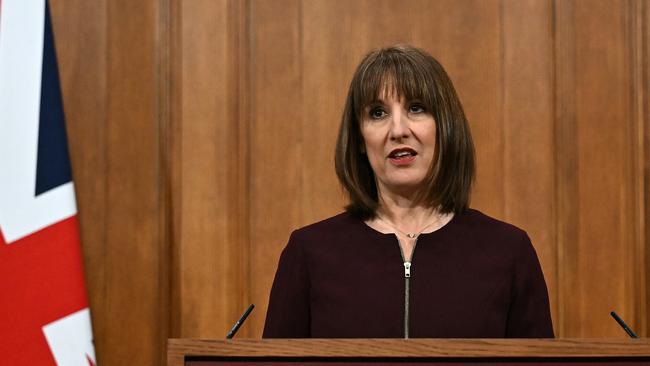Trump’s Tariffs threaten to smash UK’s fragile growth
Britain’s Chancellor of the Exchequer may have to raise taxes if Donald Trump follows through on his threat to impose tariffs on Britain next week.

Rachel Reeves faces having to raise taxes or cut spending if Donald Trump follows through on his threat to impose tariffs on Britain next week, Britain’s budget watchdog has warned.
The chancellor was forced to announce in her spring statement a £14bn ($28.8bn) package of cuts to repair the public finances after the Office for Budget Responsibility halved growth forecasts.
However, the OBR also said there was a 50 per cent chance she would be forced to return with further cuts or tax increases as soon as October, because of concerns the economic outlook would deteriorate still further.
The OBR said Ms Reeves’ decision to leave herself with a “tiny” cushion of £9.9bn meant that relatively small changes to the economy – whether from the impact of tariffs, lower productivity or an increase in the cost of borrowing – could wipe out her fiscal headroom. The chancellor refused to rule out raising taxes.
The watchdog highlighted the threat of US tariffs of up to 20 per cent on UK exports, which are due to be announced on April 2 on what Mr Trump has called “liberation day”. The President announced a “permanent” 25 per cent import tariff on all cars and light trucks.
The forecaster said the threatened 20 per cent tariff on the UK would wipe 0.6 per cent off GDP growth by 2026, with the economic hit increasing to 1 per cent of GDP if the government imposed retaliatory tariffs.
Even if the UK were spared tariffs as part of a trade deal being negotiated by ministers, the OBR said this would still reduce GDP in the short term by 0.2 per cent because the country would be hit by the knock-on effects of a global trade war.
A 0.6 per cent reduction in GDP would wipe out Ms Reeves’ budget headroom and force her to find almost £18bn worth of further savings or tax rises. Even a 0.2 per cent reduction would result in a £6.2bn hit to the economy, according to the Resolution Foundation think tank.
The tax burden is already forecast to rise to a record level, from 35.3 per cent of GDP to 37.7 per cent in 2027-28. The increase is being fuelled by the chancellor’s decision to raise the employers’ rate of national insurance and by millions of people being dragged into higher rates of income tax because of a freeze on thresholds.
In other developments:
● A British government assessment predicted a quarter of a million people would be pushed into poverty by welfare cuts, with three million families losing an average of £1720 a year.
● Ministers are not on track to hit their target of building 1.5 million homes within the next four years: latest figures suggest the government will fall short by 200,000.
● Government departments will have to find an extra £3.6bn in day-to-day savings by the end of the decade.
● The budget watchdog said net migration was likely to fall to 258,000 by mid-2027, acting as a “drag down” on economic growth.
Ms Reeves admitted that global uncertainty was “pushing up the cost of government borrowing and pushing down economic growth” but insisted her policies were working. “While there are no quick solutions to fixing our damaged economy, our Plan for Change is starting to bear fruit,” she writes.
“I won’t shy away from the challenges we face, and change won’t happen overnight. But the prize on offer to us is immense.”
However, Paul Johnson, director of the Institute for Fiscal Studies, said the chancellor had left herself “at the mercy of events” by not giving herself more headroom against her borrowing targets.
“Reeves has left herself with the same £9.9bn sliver of headroom against her target to balance the current budget as she had in October,” he said. “We can now expect six or seven months of speculation about what taxes might or might not be increased in the autumn. There is a cost, both economic and political, to that uncertainty. The government will suffer the political cost. We will suffer the economic cost.”
Prime Minister Keir Starmer is hoping to secure an economic deal with Mr Trump this week that would spare Britain the worst of the tariffs. Ms Reeves has indicated the government is prepared to drop a tax on US tech companies in a bid to secure a carve-out.
Richard Hughes, head of the OBR, said Mr Trump’s tariffs would “virtually eliminate” the UK’s headroom.
“Scenarios where the US imposes much more significant tariffs on the rest of the world, on Europe, on the UK, do have material impacts on our growth forecast – up to 1 per cent in next year at the peak – and can have quite big fiscal effects,” he said.
THE TIMES



To join the conversation, please log in. Don't have an account? Register
Join the conversation, you are commenting as Logout